Extension Today
News from and about the 1890 Land-Grant Extension SystemMessage from the Chair

Dr. Raymon Shange, 1890 Extension Administrator, Tuskegee University
Greetings, 1890 Extension friends and family,
As we begin to wind down our peak season for camps, competitions and internships, we would like to take some time to reflect on the successes of our 4-H Youth Development programs. I would like to extend a sincere thank you to all the educators, specialists, program leaders and volunteers who make this work happen. A special shout-out to the 4-H'ers and 4-H families who trust and believe in the impact of our programs.
In our dedicated work with communities — whether rural, urban, new or non-traditional — one thing that sustains our presence is our engagement with the children of those communities. 4-H Youth Development programs provide a powerful vessel for developing the leaders, employers and workforce of the future. You will find powerful stories of family and community pride, technology education and the various strategies our institutions use to sustain and strengthen the communities and states we serve.
Thank you all for taking the time to read this issue. Continue to support 1890 Extension so that we can continue to support our future.
Coding trees, chasing dreams with Faith
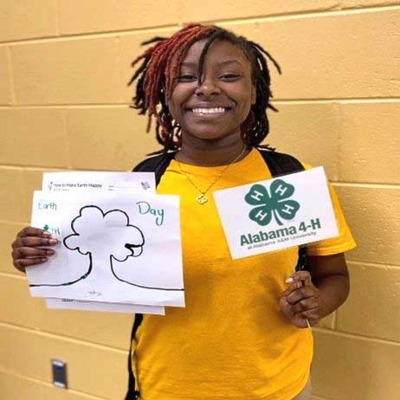
By Angela Kelly, 4-H Extension Agent
Faith Palmer, an incoming 11th-grade student at George Washington Carver High School in Montgomery, Alabama, stands out as one of the school’s exemplary scholars. She consistently demonstrates academic excellence while serving as the publicist for the school’s 4-H STREAM Club.
A dedicated and enthusiastic member of the 4-H program, Faith actively participates in club activities and eagerly anticipates each meeting. For Earth Day 2025, she showcased her creativity and technical skills by designing a tree illustration and programming Ozobots to bring it to life, beautifully aligning with the event's environmental theme.
Since joining 4-H, Faith has explored a wide range of career pathways, expanding her interests and aspirations. She is a focused and driven young lady with a strong passion for STEM and a clear commitment to making a meaningful impact in the field. Faith also represented the school during STEM Day in Huntsville, further demonstrating her engagement and leadership in STEM initiatives.
From the city to the soil: Boys and Girls Club, Vicksburg youths find inspiration through 4-H agriculture tour
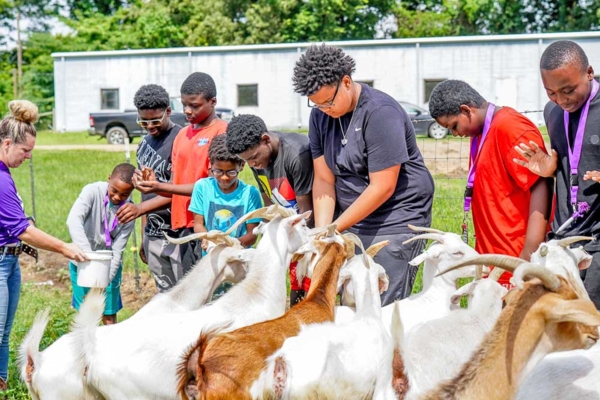
For many of the students who visited Alcorn State University (ASU), their recent visit was their first time stepping foot outside their hometowns of Vicksburg and McComb. But by the end of the day, they had explored fields, interacted with livestock, flown drones and — perhaps most importantly — discovered new dreams.
Hosted by the ASU College of Agriculture and Applied Sciences (CAAS), in partnership with the Boys and Girls Club (BGC) and the Vicksburg Family Development Center (VFDC), and supported through 4-H Youth Development, the immersive agricultural tour brought more than 65 students to the Dr. Jessie Harness Sr. Extension and Research Complex for a full day of exploration, engagement and inspiration.
After a warm welcome from Dr. Archie Williams, associate dean of academics, the students began their journey across the CAAS agricultural landscape. Their first stop was the model farm, where students got an up-close look at real-world farming operations. From feeding goats to observing chickens laying eggs in the poultry research unit, the youths stepped into the roles of scientists, caretakers and agricultural innovators.
The hands-on learning continued during a drone demonstration led by Azuli Muhammad, agriculture research and drone director. Students were given the opportunity to fly drones and learn how emerging technologies are reshaping agriculture. The day concluded with a faculty panel discussion and a presentation on scholarships and academic programs by Patrina Leonard, project coordinator of student services.
“Visits like these aren’t just field trips — they’re transformational,” said Donald M. Smith Jr., 4-H Youth Development specialist at ASU. “They spark curiosity and plant the seeds of purpose in young minds.”
Growing future leaders: How CSU Extension, Efinity Harvest are transforming youths through agriculture
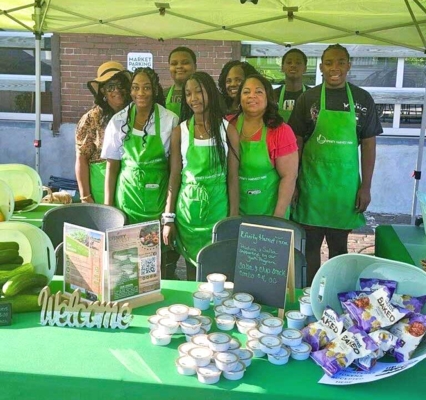
Cheryl Wheeler, founder of Efinity Harvest Farms in Trotwood, Ohio, and her daughter, Christa Wheeler, co-founder, have partnered with Central State University Extension (CSUE) to engage youths through agriculture, entrepreneurship and leadership development.
Through CSUE’s 4-H Urban Farmer Youth Initiative, students aged 11–14 participate in a 12-week program that combines farming, business training and nutrition education. Youths manage every part of the operation from growing crops and developing value-added products to designing displays and selling at farmers markets throughout the growing season.
“Our goal is to plant seeds of knowledge and confidence in every young person who steps onto the farm,” Cheryl Wheeler said. “We’re helping youths discover their strengths, build leadership skills and see that their ideas have value and impact.”
Students take on roles like junior farm manager and market manager. One youth-designed table display debuted at the Central State University Extension's Urban Farmer Youth Symposium in April and is now used regularly at markets. Guest chefs lead workshops on food preparation and safety, reinforcing skills that youths take home and share with their families. Students also learn record keeping, inventory tracking and how to understand the economics behind a working farm.
Efinity Harvest Farms continues to serve as a model for youth empowerment. “This program is creating a generational change,” Cheryl Wheeler said.
Honoring heritage, inspiring futures: Evolution of transformative youth program

This article proudly recognizes three 4-H alumni from the same family – Kalonna, Kyle and Kaylyn Maull – who have each gone on to create amazing lives for themselves, their families and their communities.
All three started in Delaware State University's (DSU) 4-H programs at the age of 9. Throughout their time in 4-H, they actively participated in the Millsboro 4-H Club and the Sussex Central High School Ladies and Gentlemen’s Club. All three never missed a weekly meeting throughout middle and high school.
In addition, the siblings attended the National 4-H Conference and Citizen Washington Focus. Kalonna Maull represented 4-H on a national radio show, showcasing the achievements of 4-H. She was selected from among six million 4-H youths across the country. Kyle and Kaylyn Maull were also members of the first Ag Discovery cohort at DSU, with Kalonna Maull serving as a counselor.
After high school, all three attended DSU, majoring in food science, nutrition and agribusiness. Kyle Maull, who earned an agribusiness degree and worked for the National Farm Bureau, is an accountant for the state of Delaware. Kaylyn Maull works for the U.S. Postal Service and is the chair of the Postal Service Union. Kalonna Maull, who earned degrees in nutrition and food science, works for the U.S. Food and Drug Administration. She is active in ministry, having recently delivered her first sermon focused on uplifting youths.
The Maull siblings credit DSU 4-H with shaping their paths and reinforcing the importance of giving back to their communities through positive youth development.
FAMU 4-H camp at BAERS empowers youths
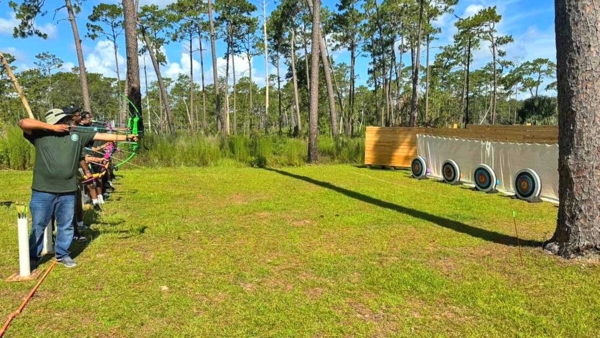
A four-day intensive Florida A&M University (FAMU) 4-H Summer Experience was organized for high school students led by 4-H Extension Educator Terrence Cole. The camp was designed to provide hands-on learning and leadership development. Set on the historic grounds of FAMU Brooksville Agricultural and Environmental Research Station (BAERS) and Chinsegut Hill, students were introduced to agriculture, self-awareness and career readiness in an immersive and inspiring setting.
Day one began with a powerful guided BAERS campus tour where students felt the heart and history, then witnessed how it is now a place of hope and healing. Day two turned up the heat with a BBQ University Competition. Students seasoned, grilled and collaborated like champions, gaining real-life culinary skills and confidence. Day three took participants into the wild at Chinsegut Conservation Center.
From archery to wetland exploration, youths became scientists, trackers and protectors of the land. Day four closed out with workshops, a scavenger hunt and deep reflections. Students shared their growth, their breakthroughs and their belief that they matter, they belong and they can lead through journaling and youth-led workshops on resilience and vision.
This wasn’t just summer fun — it was future prep, mindset shift and purpose activation. Cole’s approach blends motivational coaching, cognitive behavioral tools and trade-based training to help youths build discipline, confidence and purpose. Whether exploring agriculture, forestry, culinary arts or carpentry, students leave with skills that open real-world doors.
FAMU 4-H program at BAERS is a movement to educate, empower and elevate the next generation of leaders…BEYOND READY.
Defying circumstances: Ty’Jhon Jefferson finds purpose in 4-H
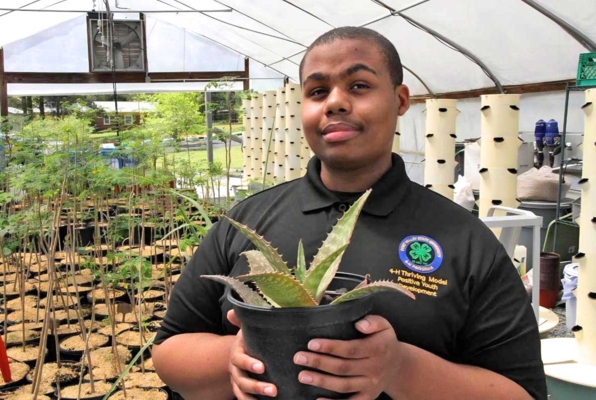
Fort Valley State University 4-H’er Ty’Jhon Jefferson says the most important thing he has learned while being in 4-H is not to let his circumstances define what he believes he can achieve.
“One of my most defining characteristics is definitely having autism,” Jefferson said. “I wanted the sacrifices my parents made for me to matter, and 4-H was one of the most important factors in ensuring that through the confidence and experiences it provided me.”
Jefferson emphasized that seeing so many successful people who looked like him and had far more life experience gave him a sense of hope he had never imagined possible.
“Through mentors simply telling their stories, such as with Mr. Woodie Hughes Jr., I gained a greater understanding of how culture, community and history can impact our lives today and how we can learn and grow from the struggles we face despite our circumstances,” he said.
Jefferson also shared, “The FVSU 4-H experience taught me that every action you make is a representation of yourself and every community that you’re a part of, which makes every 4-H’er someone who blazes a trail for those who come after them in their own way.”
He praised Hughes, his 4-H leader, for consistently supporting him and his peers, creating opportunities for them to learn and offering platforms to showcase what they had gained through 4-H.
KSU MANRRS supports PYCE with community garden tilling
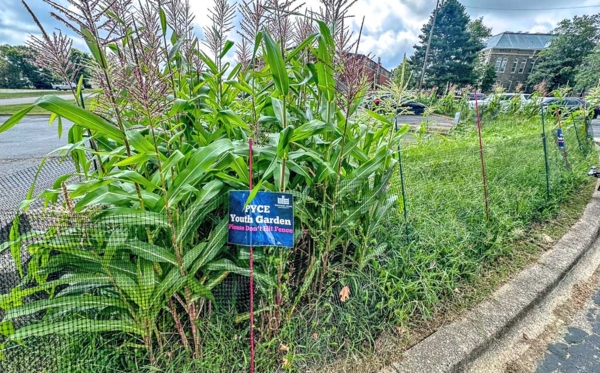
Kentucky State University’s (KSU) Minorities in Agriculture, Natural Resources and Related Sciences (MANRRS) students recently rolled up their sleeves to help prepare the Promising Youth Center for Excellence (PYCE) community garden, located behind Carver Hall.
With teamwork and dedication, members tilled the soil to kick off a new growing season, laying the foundation for a garden that will serve as both an educational space and a source of fresh produce for youths at PYCE.
“The PYCE garden is a place where young minds can explore the science of agriculture, the value of healthy eating and the impact of community collaboration. As the garden grows, we warmly invite families, students and community members to visit, check out the progress and stop by for some of the fruits and vegetables of our labor,” said David Fowler, director of PYCE. “Together, we’re growing more than plants — we’re growing promise.”
Inspiring future veterinarians: Vet for a Day engages youths in animal science
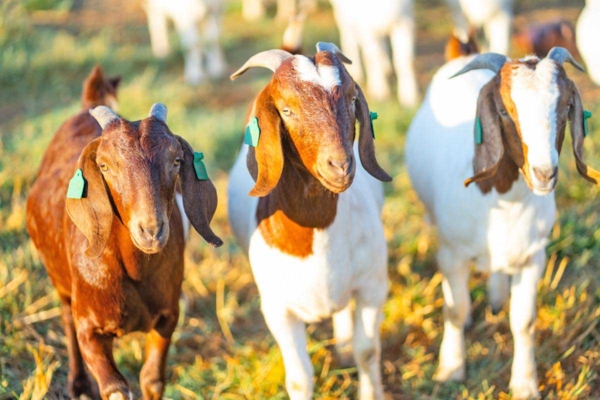
The Langston University Cooperative Extension and Outreach Program of the Sherman Lewis School of Agriculture and Applied Sciences (LU-SL/SAAS) hosted more than 35 high school students from Oklahoma County District 5 for its first Vet for a Day program during spring break.
Designed to encourage more African American youths to consider careers in veterinary medicine, the event also responded to a growing national shortage of veterinarians by sparking early interest in animal health professions. Students rotated through six hands-on learning stations focused on goat health and management:
- Fecal egg counts – Identifying internal parasites under a microscope using McMaster slides.
- Semen analysis – Evaluating frozen semen samples using the iSperm system to assess fertility.
- Mastitis testing – Using the California Mastitis Test to detect infection in milk samples.
- Health exams – Conducting basic assessments.
- Ultrasound imaging – Viewing real-time scans of pregnancy.
- Anemia evaluation – Using FAMACHA scoring and blood centrifugation to detect parasitism.
Over lunch, students heard from Dr. Bill Mitchell, an African American veterinarian and owner of Bristow Veterinary Clinic in Bristow, Oklahoma, who shared his journey into the profession and answered student questions.
This impactful event was made possible through the support of It’s My Community Initiative (IMCI), a 501(c)(3) nonprofit organization based in Oklahoma City and dedicated to strengthening communities by building strong, healthy families. Special thanks to Cedric Currin Moore, youth program manager at IMCI, and Jeremiah Wilson, deputy associate Extension administrator, LU-CEOP.
The event was a resounding success, sparking youths' interest in animal science and veterinary medicine and providing participants with the inspiration and confidence to imagine a future working with animals.
4-H students battle for air, land dominance in 2025 Game of Drones
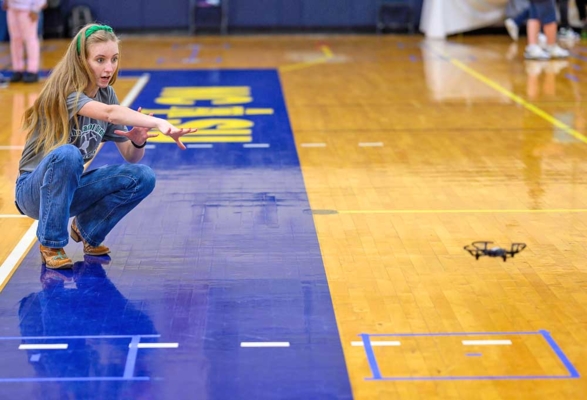
Students from 4-H teams from 14 North Carolina schools clashed at North Carolina Agricultural and Technical State University this spring, testing their coding and critical thinking skills during the 2025 4-H Game of Drones competition.
The reward? To be declared the “Rulers of Earth and Sky.”
“We see this as an opportunity to give students the skill of coding and decoding that can be applied in the classroom and future career pathways,” said Jeffrey Zepps, host and CEO of STEMerald City LLC.
In land and aerial-based challenges, the five high school and nine middle school groups were given eight missions to decipher a mission, then write code using Python and JavaScript to navigate rolling and aerial drones to different points on a grid, scoring points for accuracy.
“We’re trying to help our 4-H students become better problem solvers, better communicators and for them to work as a team,” said Mark Light, Ph.D., 4-H STEM (science, technology, engineering and math) specialist in Cooperative Extension at N.C. A&T.
The event also offered a “STEM playground” for younger guests, with similar land and aerial drones, as well as AI robotics demonstrations.
“The playground helps younger folks who may be siblings of contestants or just visitors from the community who want to see the competition but also can try out the robots and drones and become future participants as well,” said Light.
Youth innovators empowering agriculture

Prairie View A&M University (PVAMU) hosted the second 1890 Youth Innovators Empowering Agriculture Across America Research, Extension and Academic Program, welcoming 100 high school students from North Carolina A&T, Lincoln (Missouri), Kentucky State, Fort Valley (Georgia) and Prairie View A&M (Texas) last month.
This experience showcased agriculture through multiple lenses — traditional livestock, STEM innovation and entrepreneurial pathways — to ignite youths' interest in agricultural careers. PVAMU academic faculty, researchers and Extension professionals delivered high-quality content rooted in real-world application.
There were hands-on workshops exploring topics such as goat husbandry, microgreens, plant-based cosmetics, sausage making and kitchen chemistry. Dillyn D. stated, “What stood out the most were the hands-on experiments with food science, plants and soil. Getting to dive into these topics made learning super engaging and sparked a real interest in understanding how things work. It was cool to see science in action and how it connects to the world around us!”
Other workshops explored sustainability, ecosystem thinking, nutrition, waste reduction and creative expression. This program gave students a look into agricultural career paths, highlighted the importance of transferable skills and equipped them with the tools and inspiration to become tomorrow's ag leaders.
Ben G. states, “I’ve never considered agriculture or how important it is, how common it is and how interesting it is. I’ve now developed a new interest, particularly in animal production, focusing on meat health and inspection. Also providing me with a new community that I never would’ve thought of having, I’ve met some of the best people here.”
4-H Youth Development leaves lasting impact through Achieve Camp
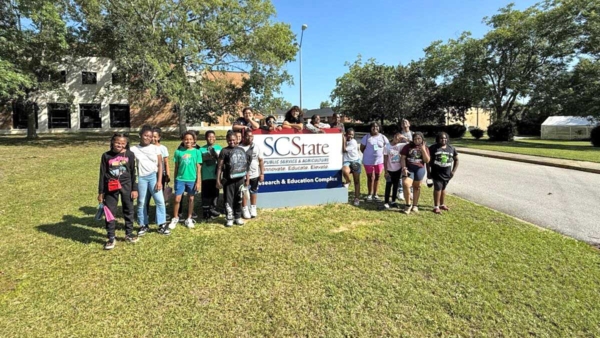
This summer, South Carolina State 1890 Extension’s 4-H Youth Development program launched Achieve Camp, a dynamic and hands-on camp experience aimed at inspiring and empowering youths through a blend of STREAM (science, technology, reading, engineering, agriculture, arts and mathematics) and sports-based learning.
Hosted on South Carolina State University’s campus, campers participated in activities like robotics, DJing, archery, coding, science experiments, arts and crafts, and culinary demonstrations throughout the four one-week-long sessions from June 16 to July 18. Each activity aimed to sharpen problem-solving and critical thinking skills while fostering creativity and confidence.
Additionally, campers participated in basketball and football, promoting teamwork and physical fitness while engaging in academic exploration. Through these sessions, youths were encouraged to learn by doing.
“The impact of Achieve Camp has been incredible,” said Sam Felder, 4-H camp director. “You can see the growth in confidence and curiosity in just a week. It’s powerful to watch our campers grow while having fun.”
Achieve Camp provides students with a safe space to explore their interests, acquire new skills, build friendships and grow academically and personally. As 4-H continues to expand its reach and impact, summer programs like Achieve Camp demonstrate how youth development initiatives can change lives, one camper at a time.
Drone Demo Daze: Student voices take flight
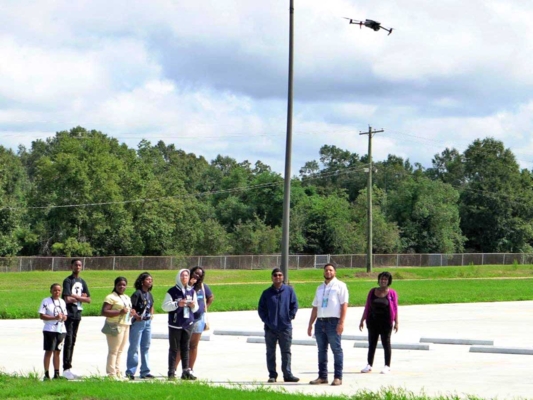
The Southern University Ag Center's Drone Demo Daze continues to make a meaningful impact by introducing youths to the exciting and ever-evolving world of drone technology. Led by the Youth Development’s Precision Agcademy team, this engaging outreach program gives students a chance to explore drones up close through interactive demonstrations, safety instruction and hands-on flight training.
Participants also learn about the real-world applications of drones in agriculture, weather monitoring, photography and engineering, as well as the growing career opportunities in the drone industry. For many students, Drone Demo Daze marks their first exposure to flying drones, and it leaves a lasting impression.
“To begin, the demo daze event was a very concise event where I learned about drones and how they can be used in the agricultural industry, and various technology and terminology used in drone flight to make flying simpler, as it can be challenging,” stated Dedric W., a 14-year-old Drone Demo Daze participant.
Thirteen-year-old Torian S. also echoed Dedric’s comments. “The drone course was an amazing place to learn about different types of drones and also how they use them. Overall, I enjoyed the drone class and would attend again.”
The program offers a comprehensive introduction to drone technology, focusing on drone safety, career opportunities and meteorological considerations for safe flying. By integrating science, technology, engineering, agriculture and math (STEAM), Drone Demo Daze has introduced youths to the possibilities within the growing field of unmanned aircraft systems. For additional information about this program, visit the Southern University Ag Center website.
TSU NEXTGen 4-H interns inspire future ag leaders at summer camp
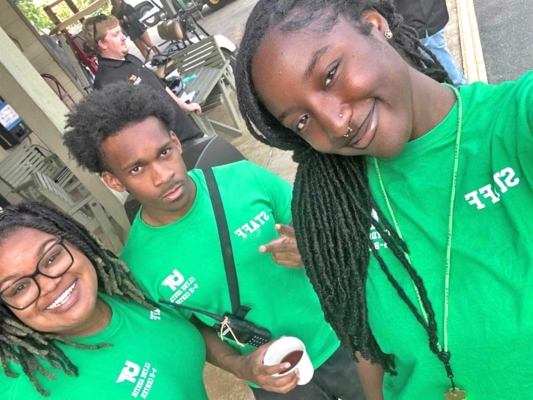
By Dr. Lana Petrie
This summer, Tennessee State University’s (TSU) NEXTGen 4-H interns brought energy and innovation to 4-H camps across the state, engaging young people in hands-on activities and introducing them to careers in agriculture and natural resources. Their involvement, made possible through the U.S. Department of Agriculture's National Institute of Food and Agriculture NEXTGen grant and TSU’s College of Agriculture, emphasized peer leadership, workforce readiness and youth development.
Throughout the camps, the interns led workshops, supported daily operations and served as mentors, helping youths build confidence while exploring the world of agriculture. Each intern brought a personal touch to their role, enriching the camp experience.
Asali Tewogbola and Khyla Gilmore used their media skills to document camp life through photos and video, highlighting moments of discovery, friendship and fun. Olivia Whitmore shared, “Being in the craft house is my favorite. I love watching the kids open up and find joy in creating something new.”
Zion Hogan balanced her time between assisting at the nurse’s station and teaching campers how to crochet. “It’s taught me patience and attention to detail,” she said. “Plus, I’ve been able to capture so many memorable moments.”
For Iverianna Gaskins, activities like Hair 101, Tie-Dye and Crocheting allowed her to connect entrepreneurship with agriculture. “This experience reaffirmed why I chose agriculture; it’s such a versatile field,” she explained.
“These students are not only gaining valuable experience, but they’re also helping youths see themselves in agriculture,” said Dr. Lana Petrie, TSU interim 4-H Youth Development state program leader. “They’re shaping the next generation of ag leaders.”
Through this internship, TSU is cultivating a skilled and passionate agricultural workforce through meaningful engagement and mentorship.
Tuskegee University's drone program empowers youths with high-tech skills
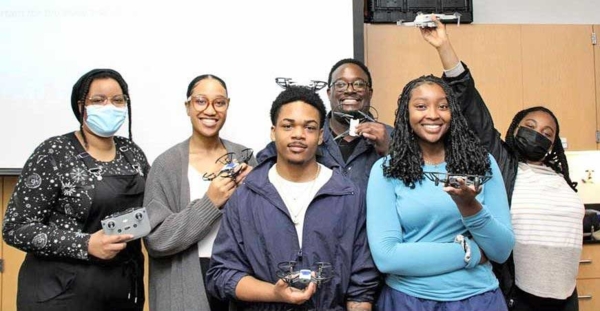
A forward-thinking initiative in Tuskegee is generating new opportunities and sparking interest in technology careers among local youths. The Drone Livestock Management Training Program, a collaboration between the Midsouth RC&D Council, 4-H and the Tuskegee University Cooperative Extension Program, has successfully equipped community members with valuable skills in drone technology.
The program provided hands-on experience in drone operations through comprehensive training, which included a two-week session at Booker T. Washington High School. The curriculum went beyond basic flight to cover essential topics such as drone safety protocols, potential career paths in the drone industry and applications of drone technology in agriculture.
A student participant highlighted the practical knowledge gained, stating, "Through this program, I learned that the TRUST certification is required to fly a drone recreationally and that a Part 107 license is needed for commercial drone operations. This training gave me a better understanding of drone safety and the career opportunities available in this field".
The program had a strong impact on high school students. The outcomes of the training show a significant shift in participants’ skills and aspirations:
- A notable 90% of participants earned their TRUST certification, which permits them to fly drones for recreational use.
- An impressive 93% of the high school participants now adhere to safety protocols when operating a drone.
- The training has also fostered entrepreneurial interest, with 53% of young participants expressing a desire to start a drone-related business.
- Nearly half, 47%, are now considering a career in the drone technology field.
- The program also reinforced the importance of higher education, with 93% interested in attending college after high school.
Kids On The Block recognized by Pine Bluff City Council
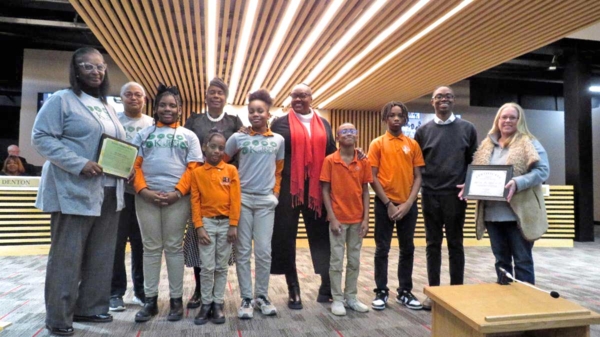
The Kids On The Block (KOTB) community 4-H Club was recognized recently by the Pine Bluff, Arkansas City Council for adopting a spot in the city’s 3rd Ward. Led by Verna Perry, CEO of the Carpenters’ Daughter Apprenticeship Program, the KOTB Club introduces youths to trades including landscaping, carpentry and plumbing.
“KOTB obtained an 'Adopt-A-Spot' in Ward 3, which is why they were recognized at the City Council meeting,” Teki K. Hunt, director of the University of Arkansas at Pine Bluff’s (UAPB) 4-H Youth Development Program, said. “Ms. Perry was also presented with UAPB’s 2024 4-H Volunteer of the Year Award during the meeting.”
Hunt said the club has been active for two years and is directed by three trained volunteers. Members learn leadership by participating in the basic 4-H club process. They are also introduced to various trades by professionals and participate in community service.
“Ms. Perry has led apprenticeships in Juvenile Justice Centers around the state. Since starting the KOTB 4-H Club, she has also begun a partnership with Ambassadors for Christ to serve youths transitioning out of juvenile detention into apprenticeships,” she said. “Ms. Perry is a 4-H alumnus. She chose to lead a club to bring the knowledge and connections that she was using with incarcerated youths to other youths in the community.”
Pollinator garden created as teaching tool for area school
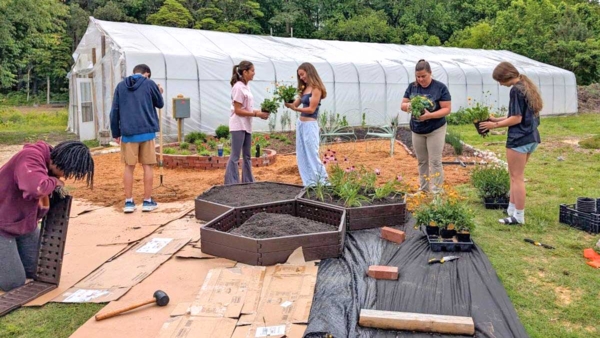
Teaching youths about the importance of pollinators is the aim of a joint University of Maryland Eastern Shore (UMES) Extension and The Salisbury School project to create an educational garden. The design features a main pollinator bed shaped like a dragon, the school’s mascot, filled with native plant species to attract bees and butterflies. In planning since March, a grand opening will take place this fall to officially introduce the garden for learning experiences for grades K-12.
The Salisbury School student delegates began by attending a weeklong Ignite conference in Washington, D.C., where they were “emersed in 4-H and STEM activities in preparation for the project,” said Theresa Maggio, UMES’ lead on the project.
These students will work with about 250 younger peers during the upcoming school year through educational and hands-on experiences in the pollinator garden, she said. The 4-H STEM educator also arranged for a May visit to the UMES Apiary, where Stephen Goewey taught them bee biology and beekeeping basics. The youth leaders helped install the garden on May 20 with the guidance of the UMES 4-H team. Building materials were funded through a $15,000 grant from Corteva Agriscience.
4-H alum, VSU graduate returns to serve the program that helped shape her
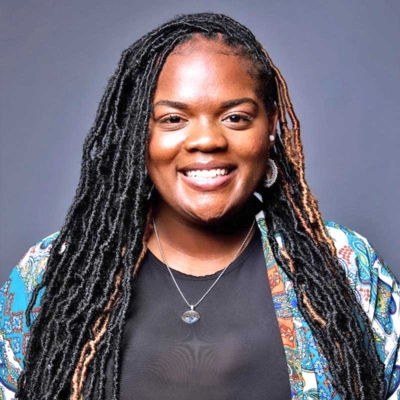
4-H can leave a lasting impact on participants. Recent Virginia State University (VSU) graduate Desmyn Owens learned she could impact her community and carried her 4-H experiences into her career as the 4-H Extension agent for Virginia Beach, where she can influence younger generations.
From in-school programs to weekend and summer camps, Owens participated in 4-H throughout her childhood. As a teenager, Owens joined the 4-H teen club and became a counselor for youth summer camps, where she worked with diverse groups of people and embraced opportunities to share camp magic with younger kids.
“It was important to be that welcoming presence and show them that 4-H has a place for everybody,” Owens says.
Owens joined VSU’s College of Agriculture through a Food and Agroscience scholarship. She dove into experiential learning with internships in urban agriculture and Extension programs providing public health outreach and bolstering 4-H programs in local schools.
“Growing up through 4-H and my internship experiences at VSU helped develop my ability to give grace and see things from different perspectives,” she says.
Now, Owens aims to bring positive 4-H experiences to all the youth of Virginia Beach. “I have a passion for giving youths opportunities so they aren’t left behind,” says Owens. “We can push our program in Virginia Beach into more urban areas and show youths that everyone can have a place in 4-H.”
With her leadership skills, eager volunteers and other successful 4-H programs, Owens is excited to bring the program into new spaces.
Exploring new horizons
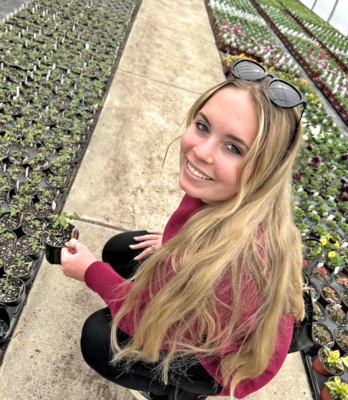
By Alisha Jarrett
In the summer of 2022, Hailey Saxton embarked on an inspiring adventure by joining the West Virginia State University (WVSU) 4-H team. Saxton was attracted to the program because it complemented her agribusiness major, fit seamlessly with her academic schedule and offered invaluable hands-on experience.
Her journey with WVSU 4-H has been enriching. Each day is filled with a variety of tasks and events, she said, ranging from assisting educators in planning and setup to taking the lead on innovative projects. She said the vibrant and dynamic environment has enabled her to cultivate essential skills, forge professional connections and lay the groundwork for her future career.
As she works toward her bachelor’s degree in agribusiness, Saxton envisions a promising future as a WVSU 4-H Extension educator after graduation. The skills and experiences she is acquiring through her internship are invaluable; they have not only enriched her education but also profoundly shaped her aspirations.
“In West Virginia, where many young people face various challenges, initiatives like 4-H can ignite creativity and open doors to new career pathways, creating a lasting impact on their lives,” she said.
She strongly encourages her peers to explore internships or volunteer opportunities with 4-H. The program offers a wealth of knowledge and practical experience across multiple fields, including STEM, agriculture and civic engagement, making it a vital resource for both personal and professional growth.
